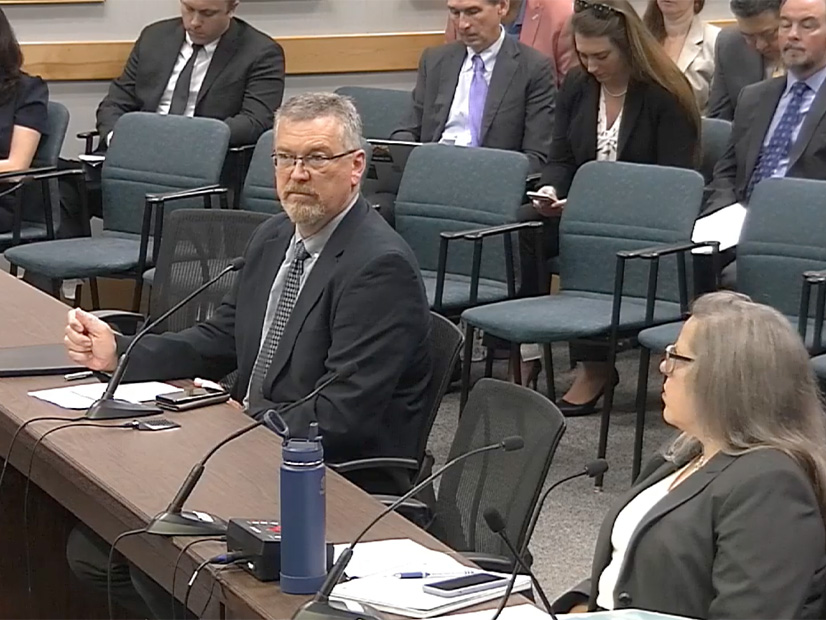Newly minted ERCOT COO Woody Rickerson told Texas regulators Thursday that last week’s Level 2 energy emergency alert was a necessary “balancing act” to protect ERCOT’s system equipment and to prevent load shed.
“I think the operations team did a really good job in very unusual circumstances,” Rickerson said in reviewing staff’s report of the Sept. 6 event during the Public Utility Commission’s open meeting. “It’s not something you see every day, but they were able to balance the two things and maintain reliability.”
Rickerson told commissioners several factors contributed to low power reserves that led to a drop in system frequency from 60.1 Hz to 59.9, the most significant being an “unusually” hot summer that has resulted in “abnormally” high demand. (See ERCOT Voltage Drop Leads to EEA Level 2.)
He said declaring a Level 2 EEA that bypassed Level 1 allowed ERCOT to deploy its responsive reserve service, or spinning reserve, and to interrupt power to some large industrial users. The alert was issued at 7:25 p.m. as solar power began ramping down in the evening after the ISO had already called on most of the ancillary services it relies upon during tight operating conditions.
The grid operator normally calls a Level 2 alert when its physical responsive capability (PRC) is less than 1,750 MW and not expected to recover within 30 minutes. Rickerson said the PRC had dropped to 2,104 MW at the time of the frequency decay.
“We suspect that the PRC number was not accurate,” he said. “We’re looking for why … there were several possible reasons.”
Rickerson, who was promoted to COO two weeks ago, said staff are conducting a more detailed analysis that will be shared with the PUC.
“We had relatively low wind that day, we had a congestion problem that caused us to curtail some generation, and all this occurred right in the middle of a solar down-ramp … so all these things were moving at the same time,” he said.
Thermal outages were just over 6 GW — “in line” with the summer’s forced outages, according to ERCOT’s report — during Sept. 6’s late afternoon and early evening hours. However, much-needed power from South Texas wind farms was restricted by an overloaded 345-kV transmission south of San Antonio. ERCOT was forced to order a manual curtailment of 1,590 MW of generation from the South to avoid “significant consequences” to grid reliability.
ERCOT’s board recently approved a transmission project it said would help address congestion in South Texas. The PUC has not yet considered the project for approval. (See “San Antonio Tx Projected OK’d,” ERCOT Board of Directors Briefs: Aug. 30-31, 2023.)
Commissioner Jimmy Glotfelty asked whether the transmission line was dynamically rated and whether it was rated accurately. Rickerson responded that ERCOT relies on transmission providers, who make their own line ratings.
“The new San Antonio line will help, but the biggest thing that would help would be generation north of San Antonio. That’s the remedy,” Rickerson said.
Glotfelty also asked Rickerson to provide more information on thermal outages in North Texas, saying, “There’s a lot more to look under the hood here.”
Rickerson promised ERCOT’s next report will “beef up” the generation limitations.
“We always look at these types of operational incidents as opportunities, places to sharpen our tools and improve our procedures,” he said. “There are some things we can change and procedures to make these things more rote for the operators. We are going through a phase where our grid is not the grid we had in the past and we’re going to have new challenges. Our procedures and processes will need constant tune-ups to keep up.”
PUC Files Proposed Rulemakings
The commission approved for publication a rulemaking that creates the committee overseeing the Texas Energy Fund loan program created during the 2023 legislative session (55407).
The rulemaking is a result of Senate Bill 2627, which sets aside billions for new dispatchable generation, backup power and upgrades in ERCOT and the non-ERCOT portions of Texas. Non-ERCOT utilities can use these funds to modernize or weatherize facilities and for resiliency improvements. Energy storage facilities are not eligible.
SB2627 requires the PUC to evaluate loan applications based on service quality, operational efficiency, a history of in-state operations, and other factors. The loans will have a 3% interest rate and 20-year terms.
The Texas Backup Power Package Advisory Committee, comprised of three to nine members appointed by the PUC’s executive director, will be responsible to recommend the grants’ and loans’ criteria to the commission.
Commission staff is holding a workshop on the loan program Thursday.
Texas voters will have an opportunity to approve or reject the program during the Nov. 7 statewide elections.
The PUC also approved for publication rulemakings that:
- Set up an emergency pricing program activated when ERCOT’s average system-wide energy price has been at the $5,000/MWh high system-wide offer cap for 12 hours within a rolling 24-hour period. The program’s emergency offer cap will be set the low system-wide offer cap of $2,000/MWh (54585).
- Create annual resiliency plans to be filed with the PUC by transmission and distribution service providers (55250).
- Direct transmission and distribution utilities to perform circuit-segmentation studies and determine whether load shed can be managed more effectively (55182).
The proposals are published on the PUC’s website and in the Texas Register and are unable to be adopted as final rules for 30 days. A public comment period is held during that time.




